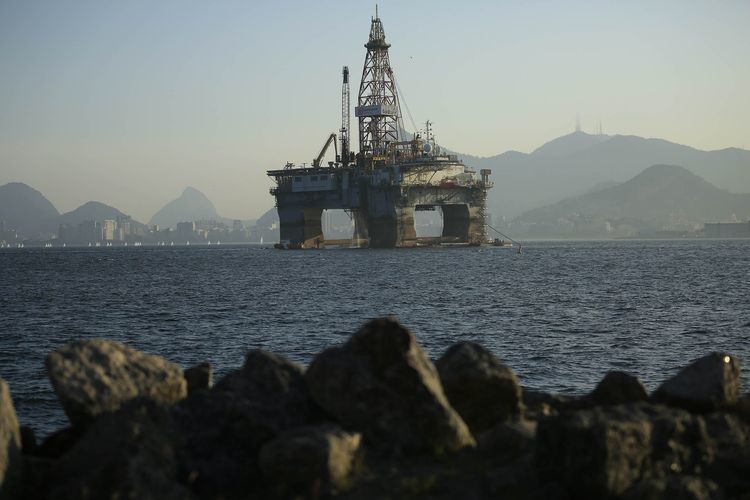
Brazil had its second failed oil auction in two days, prompting government officials and the head of the state-run producer to criticize bidding rules.
One of five available blocks received a bid on Thursday, a day after two out of four blocks went unsold. Once again, most major oil companies stayed away. Brazil’s Economy Minister said the almost complete absence of foreign players left him “terrified,” and that it send a message that it’s difficult to do business in Brazil.
“No one showed up,” Paulo Guedes told reporters in Brasilia. “We went through a lot of trouble and, in the end, we sold things to ourselves.”
Fourteen companies had signed up to bid Wednesday for an area that’s estimated to hold as much as 20 billion barrels of oil. It was the largest auction of reserves since the end of the second Gulf War. In the end, it was mostly Petrobras doing the bidding: the state-run company won the largest block by offering the minimum with two Chinese partners and it won another block for which it was the sole bidder. Two more blocks didn’t attract any bids.
Thursday bidding saw Petrobras and its Chinese partner scoop up a block at the minimum offer while four other blocks received no bids.
“The amount that companies would need to commit upfront, with license fees and compensation to Petrobras, was too high,” Petroleo Brasileiro SA Chief Executive Officer Roberto Castello Branco said in an interview, while also citing regulatory uncertainties. “We haven’t given up on our partners; they’ve given up on us.”
Brazil’s oil regulator said rules that give Petrobras pre-emptive bidding rights “inhibited” other companies from taking part.
“It does not seem to be a good judgment to keep the regime as it is today,” Mines and Energy Minister Bento Albuquerque told reporters.
The auctions were meant to be part of Brazil’s shift away from nationalistic oil policies, helping it inject of foreign cash to develop reserves. The government had estimated Wednesday’s auction — comprising the so-called transfer of oil rights — would raise about $25 billion in fees and another $25 billion in compensation for Petrobras, which has already invested in drilling and platforms. In the end, the total for licensing was $17 billion, and Petrobras will receive just a fraction of what it expected initially.
The results hit Brazil’s currency and the share price for Petrobras, which fell more than 5% before finishing the day little changed. An analyst called the auction a “total disaster” for the government.
For more on the flopped mega oilfield auction, click here
Castello Branco said there were concerns among the oil majors about what decisions Pre-Sal Petroleo, an agency created to manage the government’s share of the country’s production, would make in the future.
In the days prior to Wednesday’s auction, there were already signs that the outcome would be a disappointment for the government. BP Plc and Total SA said they wouldn’t bid, while Exxon Mobil Corp., which has built the largest offshore exploration portfolio in Brazil after Petrobras, expressed concern about the high costs.
Seeing the oil majors that have long partnered with the company dropping out or wavering, Castello Branco said he called Petrobras Chief Financial Officer Andrea Marques de Almeida into his office as the day of the auction approached.
“If we want to go it alone — can we?” he asked. The reply: “We can.”
Castello Branco said Petrobras can develop the giant Buzios deepwater field it won on its own without compromising financial discipline. The company has funds to pay for all the fees and still reduce debt this year. Petrobras ended the third quarter with a strong cash position, and it also has 34.1 billion reais ($8.3 billion) of credit with the government it can use to pay for the fees, Castello Branco said.
The company was aiming for at least 30% of the Buzios field, not the 90% it ended up with, he said. Chinese partners only took a 10% stake.
Recommended for you
